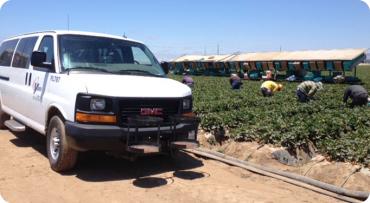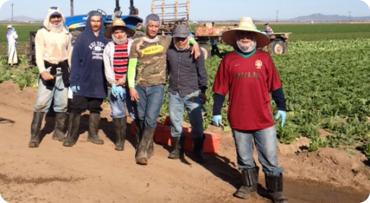Jose sips his coffee and waits in the darkness of early morning for the arrival of his coworkers. The gas station in Calexico, California near the border crossing from Mexico is far from his home in the Salinas Valley, but maintaining year-round employment depends on relocating when the harvest ends further north.
Jose lowers the volume of the radio inside the 16-passenger van to greet the first of his fellow crewmembers to climb aboard. Several of the men and women who ride with him to work in the “Winter Vegetable Capital of the World” arrived at the Mexican side of the border hours ago, coming from the only affordable housing available to them.

Laughter warms the chilly, predawn air as farmworkers fill the van and dozens like it parked nearby. Newer to the landscape than the familiar large buses adorned with logos from various Central California companies, the white vans each feature the bright blue and orange CalVans logo.
In the winter of 2011, CalVans began providing agricultural vanpools to California employees relocating to Imperial County. The reliable, insured vehicles offer occupants a safe and comfortable commute paid for by their employer.
Growers welcome the seasonal workers who caravan from Salinas Valley, some with their entire families in tow.
These winter visitors, known as “Snowbirds” to longtime residents of Imperial County, are better able to support their families with their cost of transportation covered. By 2013, CalVans was providing over 100 vans to support the employees of 18 Imperial County growers. Lettuce, onions, asparagus and broccoli harvested by migrant workers like Jose feed millions of people across the United States.
And CalVans helps them travel safely to and from their far-from-home workplace.

Before partnering with Southern California growers, CalVans stored its agricultural vehicles during the winter months. Workers returned their vans after harvest and disbanded their vanpools.
The unused CalVans could no longer earn a profit, but continued accruing expenses for insurance, maintenance and depreciation. By shifting its agricultural vanpool fleet to Imperial County during what had traditionally been the off-season, CalVans earns income continuously and effectively supports California’s agricultural industry year round.


